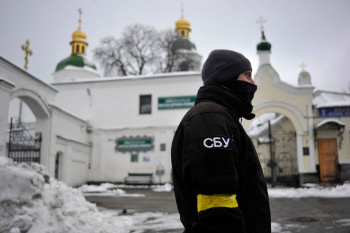Authorities search monasteries of Russia-affiliated orthodox church in Ukraine
The Security Service of Ukraine (SBU) reported on Dec. 7 that it was conducting searches in 13 Moscow-linked churches, monasteries, and adjoining facilities, such as libraries, in Cherkasy, Volyn, and Kherson oblasts to counter the possible "subversive activities of the Russian special services in Ukraine."
"Taking Russia's armed aggression into account, these measures are carried out for preventing the use of religious communities as a center of the so-called 'Russian world' and protecting the population from provocations and terrorist attacks," SBU said in a statement.
The raids come shortly after President Volodymyr Zelensky signed a decree on Dec. 2 to approve a proposal by the National Security and Defense Council to ban Russian-affiliated religious groups and impose sanctions on some pro-Moscow bishops.
The primary target of these measures is the Ukrainian Orthodox Church of the Moscow Patriarchate, an affiliate of the Russian Orthodox Church.
The National Security and Defense Council instructed the Cabinet on Dec. 1 to draft a bill on such a ban. The bill will then have to be considered by the Verkhovna Rada, Ukraine's parliament.
On Dec. 2, the SBU reported that it was conducting searches at Moscow Patriarchate churches and monasteries in Zhytomyr, Rivne, and Zakarpattia oblasts.
During previous raids, the SBU said it found Russian propaganda and xenophobic literature, Russian passports belonging to senior clergy, and documents with pro-Russian ideological messages at the premises of the Russian-backed church.
In May, the Moscow-affiliated Ukrainian church said it would have "full independence" from the Russian Orthodox Church, reacting to criticism of Russian-backed church leaders amid the full-scale invasion of Ukraine.
Also, the Ukrainian branch said that it "condemns the war" and "disagrees with the position of Patriarch Kirill of Moscow on the war in Ukraine."
However, skeptics said it was just a ploy to appease critics since the Ukrainian branch effectively remained part of the Russian church and did not declare "autocephaly" – the Orthodox term for genuine independence. Under Orthodox rules, only one independent - or "autocephalous" - church can exist in a specific country.
The Russian-backed church's complete independence under Orthodox rules would imply its merger with the independent Orthodox Church of Ukraine, but the Moscow-affiliated church has opposed such a unification.










